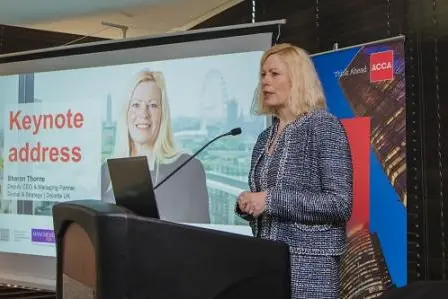PHOTO
Dubai: ACCA (the Association of Chartered Certified Accountants) brought together senior finance leaders from across the UAE to discuss the need to drive a collective vision when looking at women in finance and technology in order to close the gender gap.
In line with the association’s historical commitment, ACCA was the first professional accountancy body to admit a woman into membership in 1909 in the UK. Ethel went on to become the leading provider of income tax advice to women, eventually operating as the Women’s Taxpayers Agency.
Helen Brand OBE, ACCA’s chief executive, says: ‘ACCA was established specifically to open up the profession to people of all backgrounds, based solely on their ability. We recognise that ACCA is fortunate in our strong position when it comes to balance - 46% of ACCA members and 56% of ACCA students are women, and our Council and executive team are also balanced in terms of men and women. Opportunity and diversity are two of our core values that continue to guide our work today.
‘We believe that it’s every organisation’s responsibility to support diversity and to review and revise the way they support and open up opportunities to women – and indeed all other under-represented groups.
Cynthia Corby, Chair of the Women in Finance Forum led by ACCA in the UAE states:
“In the UAE and wider Middle East, we have seen a higher percentage of women going through the education cycle, however when we look at this transition into the workplace, we don’t see a reflective rate. Business leaders need to ensure this talent is not lost, in order to truly lead diverse organisations which go beyond the numbers.
Promotion of sustainable practices that encourages people of all cultures and ages to participate in all opportunities which are provided to those who demonstrate the ambition, drive, ability and dedication are paramount, so they can share their different perspectives and challenge our thinking and we can all thrive in our professional lives.”
She concludes “with the changing role of finance and increased emphasis on technology, it presents an opportune time to drive a collective vision, which with the use of algorithms, blockchain and innovative tech can support in reducing biased decision making in the recruitment and progression processes within organisations.”
The event was attended by senior finance and technology leaders from across industry where the attendees heard from Sharon Thorne, Deputy CEO & Managing Partner, Global & Strategy, Deloitte who was recently announced at the Chair of the Global Board of Directors for Deloitte – the first woman in the history of the firm to hold this position; Anthony Hobeika, CEO of MENA Research Partners; Maryam Mohamed Fekri, COO of Dubai Financial Market (DFM); Eleni Kitra, Facebook; Tim Parr, CEO of Deloitte Consulting; Mirna Sleiman, Founder and CEO of Fintech Galaxy and Nadine Mezher, Co-Founder of Sarwa. The event was supported by The University of Manchester, IMA, Sage, Hawkamah, Deloitte, the 30% club GCC and the Dubai Business Women’s Council.
Key facts about ACCA
ACCA has a strong commitment to gender diversity, both as a professional body and as an employer. Its Council, made up of 34 members, is represented by 21 women (61%).
- 55% of ACCA’s senior staff are women
- ACCA’s Executive Team is 50 / 50 balance
- 46% of ACCA members and 56% of ACCA students are women
ACCA was the first global professional accountancy body to:
- admit a women to membership – Ethel Ayres Purdie
- appoint a woman president – Vera Di Palma
- appoint a woman chief executive – Anthea Rose
- appoint a woman from Asia Pac as its president in 2016 – Alexandra Chin
About ACCA
ACCA (the Association of Chartered Certified Accountants) is the global body for professional accountants, offering business-relevant, first-choice qualifications to people of application, ability and ambition around the world who seek a rewarding career in accountancy, finance and management.
ACCA supports its 208,000 members and 503,000 students in 179 countries, helping them to develop successful careers in accounting and business, with the skills required by employers. ACCA works through a network of 104 offices and centres and more than 7,300 Approved Employers worldwide, who provide high standards of employee learning and development. Through its public interest remit, ACCA promotes appropriate regulation of accounting and conducts relevant research to ensure accountancy continues to grow in reputation and influence.
ACCA has introduced major innovations to its flagship qualification to ensure its members and future members continue to be the most valued, up to date and sought-after accountancy professionals globally.
Founded in 1904, ACCA has consistently held unique core values: opportunity, diversity, innovation, integrity and accountability. More information is here: www.accaglobal.com
Contacts:
Nav Dulay
E: navdeep.dulay@accaglobal.com
Twitter: @ACCANews
Disclaimer: The contents of this press release was provided from an external third party provider. This website is not responsible for, and does not control, such external content. This content is provided on an “as is” and “as available” basis and has not been edited in any way. Neither this website nor our affiliates guarantee the accuracy of or endorse the views or opinions expressed in this press release.
The press release is provided for informational purposes only. The content does not provide tax, legal or investment advice or opinion regarding the suitability, value or profitability of any particular security, portfolio or investment strategy. Neither this website nor our affiliates shall be liable for any errors or inaccuracies in the content, or for any actions taken by you in reliance thereon. You expressly agree that your use of the information within this article is at your sole risk.
To the fullest extent permitted by applicable law, this website, its parent company, its subsidiaries, its affiliates and the respective shareholders, directors, officers, employees, agents, advertisers, content providers and licensors will not be liable (jointly or severally) to you for any direct, indirect, consequential, special, incidental, punitive or exemplary damages, including without limitation, lost profits, lost savings and lost revenues, whether in negligence, tort, contract or any other theory of liability, even if the parties have been advised of the possibility or could have foreseen any such damages.




















